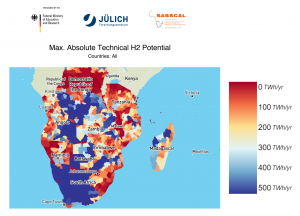The first Atlas of Green Hydrogen Generation Potential in Southern Africa has been launched
On the 11 May 2023, Dr Jane Olwoch, the Southern African Science Service Centre for Climate Change and Adaptive Land Management (SASSCAL) Executive Director and Dr Solomon Agbo coordinator of the H2Atlas Africa at Forschungszentrum Jülich GmbH, Germany, together with Regional Technical Committee and National Teams viewed and launched the first Green Hydrogen Atlas Southern Africa results. The H2Atlas interactive map can be accessed via https://africa.h2atlas.de/. The Atlas provides evidence-based information on different resources for the production of Green Hydrogen. These include; water resources (ground and surface), land availability, renewable energy resources (solar and wind) and the levelized cost of hydrogen production and other key indicators like social, policy framework, export and transport and political and energy regulatory framework. These are key elements for policy-makers, investors, researchers, and potential funders about the potential of a Green Hydrogen development in the Southern African. National launches are planned in the second half of the year.
The official launch was proceeded by the announcement of its completion by Hon. Bettina Stark-Watzinger, Minister of the Federal Government of Germany during the Launch and Award Ceremony of the Pilot Projects and the Youth for Green Hydrogen (Y4H2) Scholarship programme in Namibia on the 29th of March 2023.
The Atlas marks a significant milestone in the Green Hydrogen developments in Southern Africa. This comes amid a global movement to transform the global energy sector into one which contributes to climate-friendly products.
The project results presented in the form of an interactive atlas shows the “locations of interest” in 12 Sothern African countries. The Atlas serves as the first science based decision support tool for the concept and design of green hydrogen pilot plants to be developed. Over 13 Countries, 60 Scientists, 16 Modellers and 12 Member Regional Technical Committee team participated in the production of this Green Hydrogen Atlas. Several products can be accessed through the link provided above (the figure below is an example).

The max. technical hydrogen potential (absolute) represents the theoretically producible amount of hydrogen of each GID 2 region (SADC administrative boundaries) and depends on region size and average potential per area. The amount is limited only by the land eligibility constraints and the available power limited by energy intake (wind, solar radiation).
The Atlas can contribute to the development of National and Regional roadmaps and strategies for enabling a green hydrogen-based economy in sub-Saharan Africa. It is of great relevance to both Germany, Africa and globally. The project results provide relevant information which German and African businesses/industries can leverage in partnership to provide the appropriate technology for sustainable development.
The H2Atlas project was sponsored by the German Federal Ministry of Education and Research (BMBF). SASSCAL is the coordinating partner in Southern Africa and has collaborated with the SADC Centre for Renewable Energy and Energy Efficiency (SACREEE) as a technical implementing partner.
The H2Atlas-Africa project will support climate adaptation and mitigation programs by providing ground truthing (empirical evidence) data that can be used for sustainable energy production and enhance a green economy in SADC. The uptake of green hydrogen locally and internationally will enable SADC region to participate in the global just transition to a green economy along the entire value chain of the Hydrogen production without leaving anyone behind.
The H2Atlas project main focus was on detailed technological, environmental, economic and social feasibility assessment, taking present and future local energy demands into consideration. The Atlas also takes into account environmental issues and climate impact projections, water and energy demands, land eligibility and demand.
The results of the H2Atlas for Southern Africa are readily available and shows enormous potential for the production of green hydrogen throughout the region. The production “hot spots” can be viewed in the interactive map via the following link https://africa.h2atlas.de/
For more information, contact:
SASSCAL Communications
Email: communications@sasscal.org




